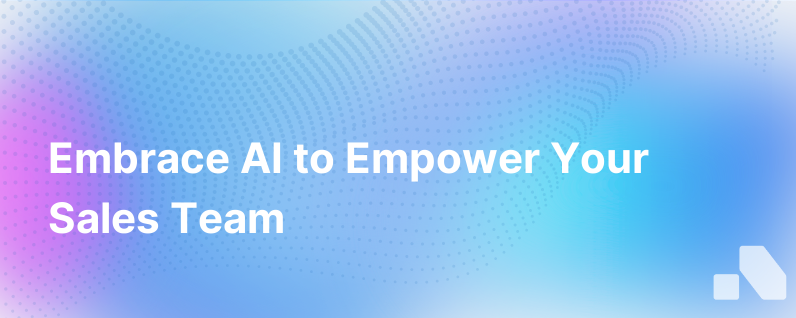
Embracing the AI wave is today’s imperative for any sales organization determined to stay ahead in the highly competitive business landscape. AI has rapidly evolved from a nice-to-have to a must-have technology that has the potential to revolutionize the way sales teams operate. Implementing AI into your sales strategy can lead to more strategic selling, better customer experiences, and ultimately, a significant uptick in sales outcomes.
Let’s dissect how AI can empower sales teams, streamline operations, and strengthen client relationships, ushering in a more efficient and impactful sales era.
AI: A Game-Changer for Sales Enablement
Transforming Data into Insights
One of the most potent aspects of AI is its ability to transform vast amounts of raw data into actionable insights. Sales teams often find themselves struggling to sift through customer data, sales figures, and market research. AI algorithms excel at recognizing patterns and predicting outcomes from these data sets at scales and speeds no human could achieve. Consequently, sales reps can be equipped with key insights about customer behavior, preferences, and purchasing history, allowing for more personalized and impactful engagement strategies.
Lead Scoring and Prioritization
AI significantly improves lead scoring by not solely relying on standard demographic factors but also gauging behavioral data and subtle nuances that signal a lead’s true intent. It can help determine which prospects are most likely to convert or which customers are ripe for upselling, allowing sales reps to prioritize their focus on the most promising opportunities.
Enhanced Sales Forecasting
Predictive analytics is another facet of AI that can massively benefit sales forecasting. While traditional forecasting methods may be heavily reliant on intuition and past trends, AI's predictive capabilities can provide a more accurate and nuanced forecast, taking into account a wide array of variables that impact sales outcomes. As a result, sales teams can better predict monthly or quarterly performance and adapt strategies accordingly.
Automating Routine Tasks
Much of a sales rep's time can be consumed by mundane, routine tasks that take time away from actual selling. AI can step in as a digital assistant to automate these tasks, including scheduling meetings, following up on leads, or updating CRM records. This automation allows sales professionals to concentrate their efforts on building relationships and closing deals.
Crafting Personalized Sales Content
In crafting sales content, AI-tools can not only provide information about lead interests and behaviors but can also generate tailored content. Whether it's personalized email outreach or targeted product recommendations, AI can help ensure that your sales communications resonate more deeply with your prospective customers.
Streamlined Training and Coaching
AI-powered tools have the ability to analyze calls, meetings, and emails to provide real-time feedback to reps. They can suggest areas of improvement, track progress, and guide reps through tailored training programs. This facilitates a continuous learning culture within the sales team, ensuring that skills and tactics are consistently honed.
Implementing AI in Your Sales Strategy
To fully embrace and implement AI in your sales process, consider the following steps:
-
Start with a Clear Strategy: Define what you want to achieve with AI. Are you looking to improve lead qualification, sales forecasting, or customer engagement? Your goals will guide your AI strategy and technology choices.
-
Clean Your Data: AI is only as good as the data it works with. Ensure your data is accurate, comprehensive, and clean to leverage AI's full potential.
-
Choose the Right Tools: There’s an array of AI sales tools available in the market. Identify the tools that best align with your sales goals. Tools like Salesforce's Einstein, HubSpot's Sales Hub, and Aomni for personalized sales content are potential candidates for evaluation.
-
Train Your Team: Ensure your sales team understands the capabilities and potential of AI. This includes knowing how to interact with AI-driven tools and interpreting the insights provided.
-
Monitor and Refine: Continuously measure the impact of AI on your sales outcomes and be prepared to refine your approach. AI in sales is a dynamic process, with models requiring regular training as market conditions change.
Case in Point: How Aomni Augments Sales Success
Take Aomni, for example, an AI platform specifically designed for B2B sales. It offers a suite of integrated tools that deliver real-time account research, competitive insights, and personalized sales content — all within a time frame of 15 minutes and without any extra effort from the sales rep.
In the context of AI-powered sales enhancement, Aomni serves as a point of reference for how machine learning algorithms can gather and process vast amounts of information. The platform's AI-driven analytics can pinpoint your prospects' pain points and highlight opportunities that might otherwise go unnoticed, empowering sales teams to engage with leads more meaningfully.
Incorporating a platform like Aomni not only saves time and increases efficiency, but also allows sales teams to approach their tasks with a degree of accuracy and personalization that was previously unattainable.
Conclusion
The AI wave in sales is not coming — it has already arrived. Forward-thinking companies across the globe are tapping into the power of AI to empower their sales teams, increase productivity, drive sales, and deliver a superior customer experience. By embracing AI technologies, sales teams can transcend traditional barriers, harness the full potential of their data, and steer their companies toward a successful, AI-augmented future.